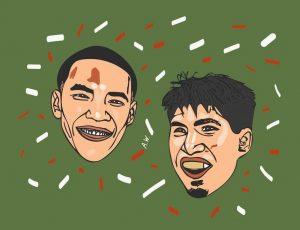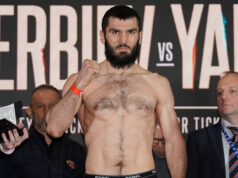By Jimmy Tobin-

Saturday night, at the Freeman Coliseum in San Antonio, Texas, moonlighting junior welterweight Mikey Garcia ran his undefeated record to 38-0, turning back a spirited challenge from Sergey Lipinets over twelve tactical rounds. It was typical Garcia: in a fight of some risk, precision and poise ensured victory and little else. There is something resembling mastery in what Garcia does; even when pressed (and Garcia’s face today reveals just how mischievous Lipinets was) the rounds that do not go his way feel like rounds he lost, not rounds his opponent won. So tangible is his control of the action.
Some 1400 miles away, under an appropriately bruised sky at StubHub Center in Carson, California, featherweights Oscar Valdez and Scott Quigg engaged in twelve rounds of ritualized violence whose residuals could figure well after the marks of battle have faded. Valdez rightly had his hand raised in the end, and among his spoils the victor should find a longer than usual hiatus from the ring, one that will diminish not at all the memory of his performance nor the anticipation that will meet his return. Attrition need not be Valdez’ game, but he obliges any such invitation.
While it seems natural to contrast Garcia and Valdez there are problems with such an approach, not least of all the fact that this mode feels reductionist, if only because to establish clearly the demarcation is to pigeonhole both fighters, to misrepresent the breadth of their talents. Still, risks aside, there is a mirroring with Garcia and Valdez of some interest.
Garcia is a fighter who covets control; when it is his, he moves confidently. When that sense of control waivers though, so too does Garcia, and rather strikingly, unbecomingly, of a fighter with his reputation. It is in these moments that one wonders whether this once aspiring police officer who retired long enough to extricate himself from the control of Terence Crawford’s promoter is simply doing the job he is best suited for. And that he knows it. Because Garcia is as calculating beyond the ropes as he is between them—which is why his toughest fight to date was the one that kept him out of the ring.
There was another tremor of Garcia’s resolve on Saturday when Lipinets speared his nose; the product not only of a punch but of a rhythm and pressure that put Garcia on edge. Garcia responded as he always does, not with fire, but with the strategies of control: jabs and a return to space (along with a handful of hard combinations designed to preserve it). And the left hook that dumped Lipinets in the seventh round? An act meant to steady the action more than end it, with Garcia flashing an evil so that he might risk no more in asserting it.
Faced with challenges of his own, Valdez did not react this way, and it is fair to wonder if he would even want to.
No one would have faulted Valdez for pulling out of Saturday’s fight. Yet against an opponent who even given multiple opportunities passed on making weight, and whose disregard for the scale was a sign of how intent he was on winning, Valdez never waivered. Instead, he took the opportunity to punish Quigg for daring attempt to skirt the rules. And punish him he did.
Quigg hardly shied from his fate, fracturing Valdez’ jaw along the way, but every time he hurt the Mexican fighter Valdez responded like one. There is a chance—albeit slim, given the version of Quigg that showed up—that Valdez could have employed a more controlled and controlling strategy, could have mitigated the damage he incurred. But a fighter who tattoos his name on his chest is unlikely to suffer insults well or hush the bloody expectations of his devotees. No, it was always going to be the disassembly line for Quigg.
Whether Garcia recognizes similar expectations isn’t clear. As he has been through nearly forty fights, against Lipinets Garcia was simply too good to be denied control, and that trend should continue provided his talk of moving to welterweight remains only that. Garcia has teased the idea of fighting Errol Spence, but no one who cares about him is likely to encourage such delusion (and no one else is going to credit it). No, better to return to lightweight for a series of hypothetical wins over Vasyl Lomachenko, some fantastic historical comparisons, a few more laps around the track.
The pride of the Garcia clan is going to be remembered primarily for his dominance, greatness having fallen victim to finances, a stubborn hiatus, an eye for preservation—in short, to control. And should that offend Garcia’s supporters, expect them to hurl blame anywhere but at their idol (oh how Mayweather’s shadow still looms). Valdez, by contrast, is not going to achieve the longevity or dominance of Garcia because his style and temperament will not allow it, because the outlay of his success is simply too great, and because his need to succeed is too personal. Garcia is better than him, and shrewder too: where an eye to the future is concerned, he makes better choices. But he is the type of fighter, Valdez, who is remembered for what he does in the ring; there is already no need to consider Valdez outside the context of his fights, as someone isolated from his opponents.
Garcia delivers a verdict; a body is brought before him, he interrogates it and determines its fate. Valdez delivers a product; a body is brought before him, he subjects it to his volition and creates something of value. The appeal of the latter is so much easier to understand.










